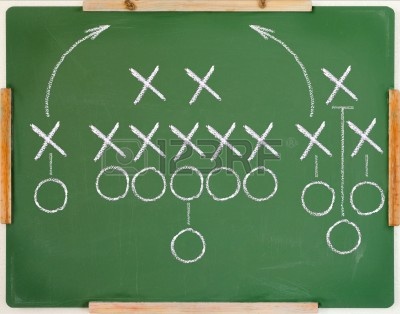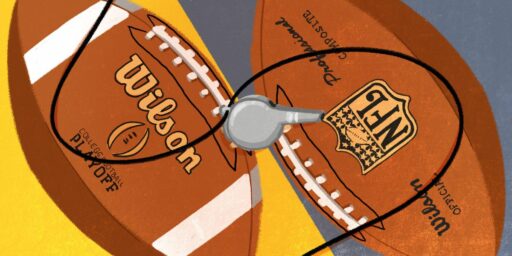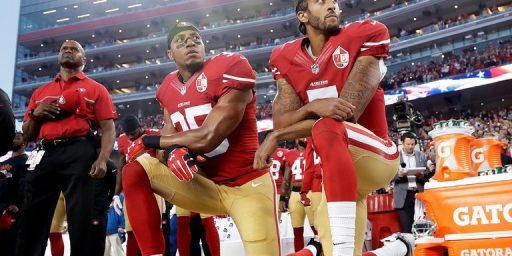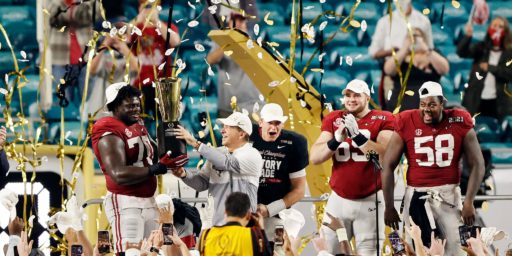Rules Matter
But they aren't magical.

As a matter of pure illustration and to illuminate, perhaps a little bit some of insight into my thinking on rules and institutional reform, I often think about the rules of sports and how their evolution changes the nature of given games. I am a sports fan in a general sense, but the one I’ve paid the most attention to during my lifetime is professional football. It is therefore the sport whose rules I understand the best, although I would not purport to be an expert of any kind.
Still, my interest in the sport and my professional interest in comparative institutional design frequently converge in my brain, insofar as the NFL is constantly tweaking its rules (i.e., engaging in reform, albeit usually in an incremental manner). If one pays attention one can see how rule changes affect behavior (something I constantly try and underscore in my writing on politics).
We just went through the NFL draft. If one scans the first round of that event, one would find a lot of quarterbacks taken. This is directly linked to the game changing over a century ago to include the forward pass. What you won’t see in that list is a running back, which is the result of more proximate changes to the rules (over the last several decades) that have enhanced the passing game. Indeed, if you look at that list of players you will find almost all of the picks are oriented around the passing game. Beyond QBs, the first round is full of wide receivers (who catch the ball), cornerbacks (who defend against the pass), edge rushers (who attack the QB), and offensive tackles (who protect the QB from the pass rush).
The first running back selected was in the 46th overall pick. And yes, the talent pool for RB was more shallow this year than last, but as a general matter, the game has clearly evolved away from the running being central (as it was even in the 1990s) to being a passing-centric game. This is by design, because fans prefer high-scoring offensive games over defensive struggles (although not all fans are of this persuasion).
So, reform can be oriented toward certain outcomes in terms of game play as a general matter (just as political reform could attempt to increase representation, for example). Other rules changes are oriented toward other goals, like player safety.
A very recent example is the change to the kickoff rule that is coming this fall. This rule will lead to teams executing new strategies and seeking out specific skills especially from kickers and kick returners and from special teams personnel in general. Exactly how teams will adapt will take a few years to sort out.
The new kickoff rule is part of a broader set of reforms designed to decrease injuries, especially head injuries. As such, we have here a perfect example of institutional reform. A goal is set, rules are changed, and then there is an ongoing assessment of whether the changes result in the desired result.
Weirdly, there are no great appeals to Walter Camp and the Founding Fathers of Football. While there are plenty of people who bemoan the loss of some aspects of the game they enjoyed, it is hard (if not impossible) to find anyone who wants the game to be played as it was in the 1800s. No one seeks to make football great again by eliminating the forward pass.
And yes, there has to be some level of willingness on the part of the participants to create the rule, enforce the rule, and support the rule. But it is rather important to note that it by no means do they require unanimous support, and even a vocal minority may oppose the rule.
There are plenty of players, fans, and sportswriters who don’t like the rules that attempt to decrease head injuries in the NFL or to protect quarterbacks as a general matter. Further, some players try harder than others to conform. But none of that has changed the general trajectory of pro football over the last several decades.
Rules matter and can change behavior, even if there is some level of resistance to that change.
But, of course, they aren’t magical. Plenty of players still lead with their helmets when tackling, despite the rules. Some do it in disregard of the rule. Others do it by accident, sloppiness, or just the exigencies of the moment. Others, still, are trying to follow the rule but fail to properly execute the tackle. Moreover, serious head injuries have not been legislated out of the game. I would note that it is nonetheless possible to study and track injuries in relation to the rules changes to then assess whether the reforms performed as desired.
To be clear: I am fully aware that the rule-making and enforcement process in pro sports is quite a bit different than that of national politics. The point of this thought, one of several that continue to rattle around in my head, is that sports can be a great way to think about the way rules affect and bind behavior. I think there are a number of instructive analogies that can be made to help the general public understand the roles played by rules, and thereby by institutions.
Without any doubt, we can see how human being in pro sports adapt to changes in the rules. They want to win, so they adapt. I think that politics is a game in a similar way (and while it may look like Calvinball, the rules do bind and shape behavior, and those rules can be changed, even if changing them is hard).
A great comparative institutional development example would be how American football, Australian rules football, rugby, and soccer all evolved from similar roots. And how specific rules choices led to the evolution of different games. Choose one pathway (shape of ball, number of players, feet-only, forward pass, etc.) and the game evolves differently. Different skills sets and strategies are needed to win, and so forth.
That is a longer discussion for a different day.
At a minimum, I think that looking at sports in the way described above can illustrate how rules matter. They shape human behavior in a shared activity and those rules, and changes to them, can affect behavior and outcomes.






I have come to realize that rules only matter when the penalty for breaking the rule is:
1) Severe to anybody likely to break it (regardless of income or status)
and
2) Likely to be administered.
@Tony W: Indeed, enforcement matters. I meant to get into how penalties shape behavior within football as an illustration.
(And there is a whole side conversation about interpretation of rules, such ask PI and holding and how that can affect the game, and behavior, as well).
Besides the structural differences between Congress and how the NFL sets rules, which are far from comparable, there are two other things in the NFL’s favor:
1) they are willing to admit a change was wrong. Not always, maybe not often, but at least sometimes. More frequently they’ll tweak rules once they measure the effects in action. See the path replay review has taken.
2) They can test rules in preseason games.
This is not something Congress can do, but a mechanism to adjust or amend a law should be easier than passing a whole new law just in order to make some changes to the existing one.
@Tony W: In education circles, we like to say that expectations without enforcement are requests.
In politics, it seems to me that the number of people who don’t want to adapt and win by the rules as they exist, but instead want to change the rules so they don’t have to adapt is increasing.
It’s like a team having a strong offense and a great kicker but is weak in the red zone and can’t get many touchdowns which loses them games. Instead of fixing their red zone offense problems, they lament at how unfair it is that field goals are only worth 3 points, and point to how much better their total scores are, total offensive yards are, and other stats as proof they are the better team and lobby the league to make field goals worth 5 points instead of 3.
Regarding the NFL though, I do think it’s bad how central the QB position is to the game now. There just don’t seem to be enough good QB’s to go around, and when a truly great player comes along, that one player can catapult a team. For me, this has made the NFL a lot less interesting to watch.
The NFL doesn’t have much by way of norms, it’s pretty much all rules, with refs. Our political system has lots of norms, and inadequate refs. It seems to turning out that for all these 200 plus years accepting an election loss has been as much norms as rules. And the refs we have don’t enforce norms.
@gVOR10: “And the refs we have don’t enforce norms.”
Good observation!
This is a great metaphor for how we should think about the political rules of the game. What sort of game do we want to play? What sort of outcomes do we want? What kind of behaviors do we want to encourage? To think that the Framers would have figured out the perfect formula, right out of the gate, for creating the right game, played the right way, advantaging the right people, and leading to the right results is unrealistic in the extreme. I wonder how Hamilton and the other Framers might have thought about the perverse way that the Electoral College operates today. Or how gerrymandering and other “rules of the game” have created minoritarian rule.
The problem, of course, is that unlike the NFL, the players are making the rules. More to the point, the players who are winning are the ones least incentivized to change the rules, so they don’t. Remember the high hopes for institutional reforms after Biden was elected. Unfortunately, none of it came to pass. No statehood for DC and Puerto Rico. No tweaking of the Electoral College, or its elimination. And so on.
I’m kind of a Burkean at heart, who believes that change can happen too fast. But it has to happen. Even before we found out, with this Supreme Court, that “originalism” was a bit of a crock, originalism always didn’t make much sense. Suppose that we had guns that fired bullets that could seek a particular target out of a city of millions, and kill that person. Should the Second Amendment make it impossible for a government to grapple with a situation in which murder with a firearm was that easy and precise? Seems more than a little farfetched.
@Andy:
I think we may be getting to the point that there are more good quarterbacks than people realize.
Just come unto Rugby Union and worship, oh ye heathen!
😉
Mores seriously: the rules-wars in RU are an ongoing hellscape.
Do not get me started about putting in straight at the scrum!
@Kathy:
On the one hand, I take the point. On the other, comparative study gives us some testing opportunities.
@Kingdaddy:
A key observation!
@Kathy:
But changing the rules in that matter would have a tremendous impact on the game. One could imagine the majority party in the Senate passing a bill through a compromise that bypassed a filibuster and then undoing the compromise once the law was passed using the “changes to existing law” procedure. To be sure, that would make future compromises even more difficult.
Relatedly, and to Stephen’s point in the OP, the relatively tiny procedural change enacted at the beginning of this Congress allowing a single member of the House to call for a no confidence vote in the Speaker has had the effect of empowering the radicals. One imagines that that will go away in January regardless of who wins the majority.
@gVOR10:
BTW, I don’t think this is true. All human systems have norms.
Is the norm to try and injure your opponent or not? Is there a norm about trying to cheat?
Baseball has clear norms about hitting batters and how teams respond, to pick one that comes to mind.
The norms in hockey about fighting have shifted over the years.
I know that there are rules linked to these things as well, but no human system is pure rules. Further, rules develop in response to norms and vice versa.
Taunting in the NFL, as well as end zone celebrations, fit this notion.
@James Joyner:
An excellent example. A very small change and it has had important consequences for outcomes and for behavior within the chamber.
An example of a sport that is rife with norms: golf.
@Steven L. Taylor: I think what you’re describing is often referred to as the “unwritten rules of the game”… which just seems like a fancier way of saying norms. These often surface when a particular context would traditionally dictate a particular behavior but nothing within the rules really addresses. For instance, running up the score or otherwise playing aggressively with a big lead.
@JohnSF: We started using scrum at work, which wasn’t the norm and I didn’t adapt. Wait, wtf are we talking about?
@Kazzy:
Great example.
(And yes, the “unwritten rules” are norms).